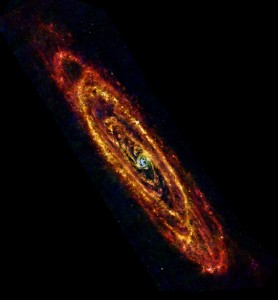The Cost of Seeing the Universe
I have always had a fondness of looking at images of stars, galaxies, and planets. In 2003, when I began working as the lead technology instructor for the Saturday Academy for Space Science at Chicago State University, I remember how amazed I was to see so many beautiful images of objects in the Universe that had been taken by the Hubble Telescope and then those that we and the students took with telescopes that are linked to the Hands-on-Universe project. Hearing the news Monday that the Herschel space observatory had closed its eyes for good filled me with sadness. While I had always been in love with the stars, the years I spent teaching in SASS solidified the awe I felt every time I looked up to the sky and saw the Milky Way. I became an amateur astronomer without realizing it and for the last ten years I have been drawn into the magic of using telescopes to see things that lie far, far, away from Earth.
When the Herschel space observatory was launched in May of 2008, its telescope and instrumentation allowed us to see the Universe in far-infrared light and gathered over 35,000 images, some as distant as the Andromeda Galaxy which lies 2.5 million light years from our Milky Way, since it began surveying the heavens. A project of ESA’s European Space Astronomy Centre, with heavy support from NASA, Herschel’s cost to date is 1.4 billion. With the current state of the government sequestration and people who remain vocal that this amount of money could be better spent on programs here on Earth, the depletion of the liquid helium that kept the instruments at a temperature near absolute zero has run out. Seeing far away has far reaching requirements and as there was no way to do a liquid helium re-supply mission to Herschel it was inevitable that the mission would end. For nearly five years, Herschel has allowed us to see stars being born, galactic dust, the Orion Nebula as never seen before, and a host of galaxies near and far from us.
While the mission has ended, the science and discoveries we will glean from the images will allow us to continue to unlock the secrets and mysteries of the Universe. Let us all take a moment the next time we look up to the sky and thank the eyes of the Herschel space observatory for five years of letting us see the Universe through its eyes.
Bon Voyage!




